|
|
|
Sort Order |
|
|
|
Items / Page
|
|
|
|
|
|
|
| Srl | Item |
| 1 |
ID:
170997


|
|
|
|
|
| Summary/Abstract |
Why do some national governments in Asia and the Pacific protect labour rights better in practice than others? This article argues that labour rights are better protected in Asia-Pacific countries where civil society organizations participate more intensively in the government's policy-making process. It goes beyond treating regime type in the aggregate and demonstrates that the associational dimension of regime type plays a critical role in shaping government protection of labour rights in Asia and the Pacific. Multivariate longitudinal analyses of all 30 Asia-Pacific countries from 1981 to 2011 find robust support for the theory, using new data on civil society participation, and controlling for electoral democracy, trade openness, economic development, unobserved country-level heterogeneity, and other factors.
|
|
|
|
|
|
|
|
|
|
|
|
|
|
|
|
| 2 |
ID:
094028
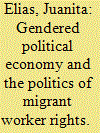

|
|
|
|
|
| Publication |
2010.
|
| Summary/Abstract |
Focusing on the South-East Asian region and looking specifically at activism around the position of migrant domestic workers in the region, this article seeks to evaluate why migrant activist organisations appear to have had, at best, modest influence on gendering the International Labour Organization's approach to labour rights. The author argues that this is largely due to how dominant understandings of labour rights have neglected the significance of social relations of reproduction (i.e. those 'care-related' activities associated with the household) to the functioning of the labour market. Furthermore, a transnationalisation of social relations of reproduction is manifested in the increased feminisation of labour migration in the region and this highlights further problems with dominant labour rights perspectives that remain largely state-centric in their approach. The significance of South-East Asian states in promoting localised regimes of citizenship/immigration and industrial relations greatly limits the ability of activist groups to claim and utilise the language of human rights. Nonetheless, the article argues that a concern with the human rights of female migrants can potentially destabilise dominant understandings of labour and human rights. More generally, the article seeks to demonstrate the insights that a critical feminist human rights approach can bring to studies of work and employment within international political economy.
|
|
|
|
|
|
|
|
|
|
|
|
|
|
|
|
| 3 |
ID:
115044
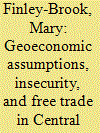

|
|
|
|
|
| Publication |
2012.
|
| Summary/Abstract |
The Central American Free Trade Agreement (CAFTA) exemplifies interconnections and contradictions between geopolitical and geoeconomic agendas, including security, democracy, and resource marketing. Central American sovereignty is selectively weakened as states are increasingly dependent on the US and must synchronise governance with the expectations of their most important trade partner or risk becoming defendants in international tribunals. Salvadoran and Costa Rican governments have been accused of upholding environmental regulations that impede the profit-earning of multinational corporations, while the Guatemalan state was charged with violating domestic labour laws. Nevertheless, criminal behaviour and impunity are widespread across the region and seldom provoke US action. Five years after CAFTA's implementation, there is evidence of the erosion of democracy, repression of civil society, and uneven distribution of trade costs and benefits. These results have led some analysts to conclude CAFTA must be renegotiated, while others recommend human and labour rights protocols accompany free trade agreements.
|
|
|
|
|
|
|
|
|
|
|
|
|
|
|
|
| 4 |
ID:
166100
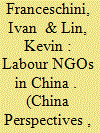

|
|
|
|
|
| Summary/Abstract |
Since their appearance in the mid-1990s, Chinese labour NGOs have mostly focused on three kinds of activities: establishing workers’ centres; carrying out outreach programs on labour rights; and conducting social surveys and policy advocacy. Some scholars have strongly criticised this approach, considering it excessively unbalanced towards an individualistic and narrowly legalistic view of labour rights and thus in line with the political agenda of the Party-state. Still, in the past few years, as labour conflict intensified, a handful of labour NGOs have moved forward to adopt a more militant strategy focussed on collective bargaining and direct intervention into worker collective struggles. Based on dozens of interviews with labour activists and workers and detailed analysis of two case studies of NGO-fostered collective labour mobilisation in Southern China in 2014-2015, this paper will outline the personal and political reasons that motivated these organisations to move beyond a narrow legalistic approach and turn towards collective struggles. It will also describe the strategies that Chinese labour activists have adopted in dealing with collective cases. We will conclude by examining the main challenges that labour activists in China have to face when dealing with labour unrest and by questioning the sustainability and feasibility of this new approach in the current political climate.
|
|
|
|
|
|
|
|
|
|
|
|
|
|
|
|
| 5 |
ID:
122468


|
|
|
|
|
| Publication |
2013.
|
| Summary/Abstract |
Nineteenth-century constitutional reformers focussed on parliament. Their central idea was citizenship, modelled variously on the democracy of ancient Athens, small communities like Switzerland, and especially the United States, a particular inspiration for Gladstone who admired its constitution. The 1911 Parliament Act marked the final triumph of the Victorian Liberals legacy, with a very different impetus coming from Lloyd George during his coalition. Labour focussed on class, not the constitution, though the ILP favoured localism and devolution, before succumbing to a centralising unionism. Tawney championed the idea of social citizenship, emphasising activism and education. After 1945, Labour did not prioritize constitutional reform until the dramatic changes that came after 1997. Gordon Brown then revived the notion of citizenship, and possible codification, in pursuing the values of Britishness. Labour's legacy was a confusing one. But Ed Miliband's policy revision could reclaim the idea of citizenship, an egalitarian concept to counter the inequalities of class.
|
|
|
|
|
|
|
|
|
|
|
|
|
|
|
|
| 6 |
ID:
127635
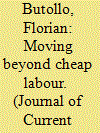

|
|
|
|
|
| Publication |
2013.
|
| Summary/Abstract |
Based on field studies in the Pearl River Delta (PRD) in 2010 and 2011, specific paths of industrial upgrading in the garment and IT industries are identified. The analysis reveals that there exists a multiplicity of upgrading trajectories, all of which have different implications for skill development and the character of work. While the modernization of industries relies on the input of higher skilled work, primarily in the fields of R&D and marketing, this barely is the case with regard to manufacturing. While labour intensity in the examined cases is diminishing in absolute or relative terms, internal divisions between low-skilled and high-skilled work are reconfigured rather than overcome.
|
|
|
|
|
|
|
|
|
|
|
|
|
|
|
|
| 7 |
ID:
101311


|
|
|
|
|
| Publication |
2010.
|
| Summary/Abstract |
This article provides a seminal analysis of collective labour legislation in Taiwan. A chronological review of Taiwan's legislative process suggests that the context of incorporation, institutional framework, mechanisms for delivering reforms, and sequence of reforms together shape the legislative outcomes of labour reforms at the collective level. While most labour legislation was revised and passed after the preceding sequence of economic transition, the reform of collective labour rights was greatly constrained by the flexible labour-market structure. In order for politicians to form new alliances with labour organizations, legislation of collective labour rights was a strategy to cultivate support during electoral periods. Consequently, the industrial relations changed following the enactment of substantial reform-oriented labour legislation. Theore-tically, the historical analysis of legislative procedure unveils evolutionary reform paths for collective labour rights in new democracies. At the same time, empirically, Taiwan demonstrates an alternative reform path in combination with incremental steps and progressive agendas. For new democracies of small economy, a window of opportunity for the progress in collective labour legislation remains open today, albeit with limitations
|
|
|
|
|
|
|
|
|
|
|
|
|
|
|
|
| 8 |
ID:
170270
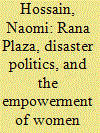

|
|
|
|
|
| Summary/Abstract |
Bangladesh’s garments workers have served as both an emblem of that country’s rapid social and economic progress, and of the precarities of labour in global value chains. Based on an understanding of how disaster politics have played out in Bangladesh’s history, this article explores whether and how the Rana Plaza disaster has been a critical juncture in the politics of the sector, resulting in a shift in power relations that empowers workers to demand and secure their rights. Drawing on a framework developed by Mark Pelling and Kathleen Dill for the analysis of the politics of natural disasters, the article explores the aftermath of the 2013 factory collapse in which 1,134 factory workers were killed. The article examines changes in workers’ own agency and resources, and in their relationships to the state and transnational actors. The article concludes that while the disaster was a turning point in key respects, it has not – unlike previous major disasters in Bangladesh – generated an elite consensus over the priority of workers’ rights and in particular of trade unions. Workers are more empowered than in the past but have yet to fully reverse their historical associational and structural disempowerment.
|
|
|
|
|
|
|
|
|
|
|
|
|
|
|
|
| 9 |
ID:
111752


|
|
|
| 10 |
ID:
129453
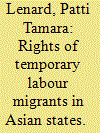

|
|
|
|
|
| Publication |
2014.
|
| Summary/Abstract |
This article considers the struggles faced by Asian states in their attempts to recruit mostly low-skilled temporary labour migrants. The article observes three trends: (1) there is a marked reluctance to admit low-skilled migrants into many Asian states, even where they are clearly needed; (2) where they are admitted, there is an associated marked reluctance to grant them an expansive set of rights, including in particular a path to citizenship; and (3) there continues to be a concern to protect the cultural basis of the nation, which serves as justification for both the reluctance to admit migrant workers and the reluctance to extend them rights. As a result of these three trends, two observations can be made. First, the presence of increasing numbers of both high- and low-skilled migrants may force Asian states to reconsider their reliance on ethno-national self-definitions. Second, however, to the extent that this reconsideration is already transpiring, it is not yet easily translating into more and better rights for, especially, low-skilled migrants, in particular with respect to the rights associated with citizenship status. The worry that migrants threaten social cohesion in Asian states, by sullying the national 'brand', prevails
|
|
|
|
|
|
|
|
|
|
|
|
|
|
|
|
| 11 |
ID:
093226


|
|
|
|
|
| Publication |
2009.
|
| Summary/Abstract |
This article investigates the nature of the linkages between trade and labor rights in developing countries. Specifically, we hypothesize that a "California effect" serves to transmit superior labor standards from importing to exporting countries, in a manner similar to the transmission of environmental standards. We maintain that, all else being equal, the labor standards of a given country are influenced not by its overall level of trade openness, but by the labor standards of its trading partners. We evaluate our hypothesis using a panel of 90 developing countries over the period 1986-2002, and we separately examine the extent to which the labor laws and the actual labor practices of the countries are influenced by those of their export destinations. We find that strong legal protections of collective labor rights in a country's export destinations are associated with more stringent labor laws in the exporting country. This California effect finding is, however, weaker in the context of labor rights practices, highlighting the importance of distinguishing between formal legislation and actual implementation of labor rights.
|
|
|
|
|
|
|
|
|
|
|
|
|
|
|
|
|
|
|
|
|